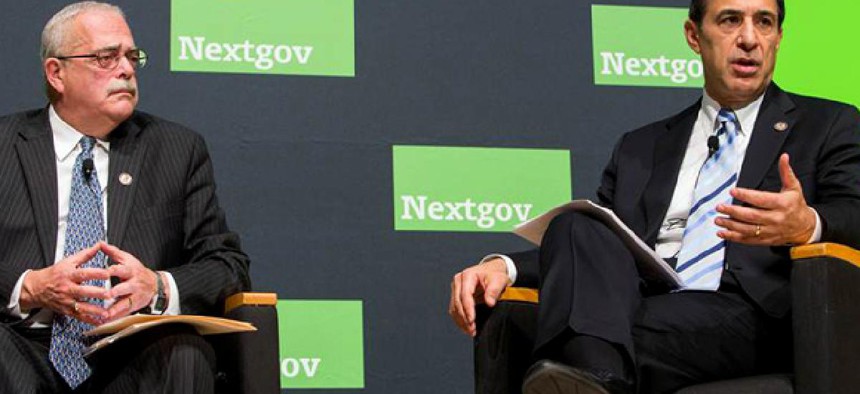House oversight leaders find rare bipartisan agreement on IT reform

Reps. Gerry Connolly, D-Va. and Darrell Issa, R-Calif. Kristoffer Tripplaar
Transparency and sharing are key in acquisitions, Reps. Issa and Connolly say.
One key to rationalizing the way information technology is managed in government is to mandate transparency about what agencies are buying and from whom, Rep. Darrell Issa, R-Calif., said during Nextgov Prime Monday.
Rep. Gerry Connolly, D-Va., who appeared onstage with Issa, agreed.
“Off the shelf software for agency X, identical to that same software for agency Y, ought not to be proprietary information,” Connolly said. “Right now, often, it is. The same company selling the same software to two agencies can insist that one agency can’t know what the other one is paying for it. And it is not uncommon, as Darrell indicated, that, as a result, we have 24 different price structures for the same item.”
Issa has proposed legislation to reform federal information technology acquisitions that, among other things, would urge agencies to use open source software when possible. A coalition of industry groups criticized that provision and others in an open letter to Issa Friday, saying they could not endorse the legislation in its current form.
Issa responded Monday that he intended the Federal Information Technology Acquisition Reform Act to be neutral about how technology is developed.
Some open source software may not be an ideal fit for government because government’s needs are sometimes unique, he said. But government agencies often have similar needs and one agency ought to be able to benefit from software that’s developed or retrofitted for another agency, he said.
Issa is chairman of the House Oversight and Government Reform Committee, which oversees many government efficiency efforts. Connolly is the ranking Democrat on the panel’s technology subcommittee.
The two have a historically combative relationship but agreed with each other numerous times during Monday’s discussion.
Connolly has praised Issa’s reform plan, but said he hopes to make some changes before the legislation is passed out of committee. Technology reform can help drastically reduce waste and fraud in government, clawing back $200 billion or more, he said Monday.
That reform could help ease the pain of any budget deal to avoid the so-called fiscal cliff in January, he said.
Issa’s bill would also mandate that each federal agency has a single chief information officer with broad budget authority, a power that only Veterans Affairs CIO Roger Baker has now.
“What we want to do is redefine the word ‘chief’ to mean chief,” Issa said during Monday’s panel. “There has to be one responsible individual who then holds their staff -- at all levels, regardless of their titles and their pay grades -- responsible. We don’t have that in the federal government.”






